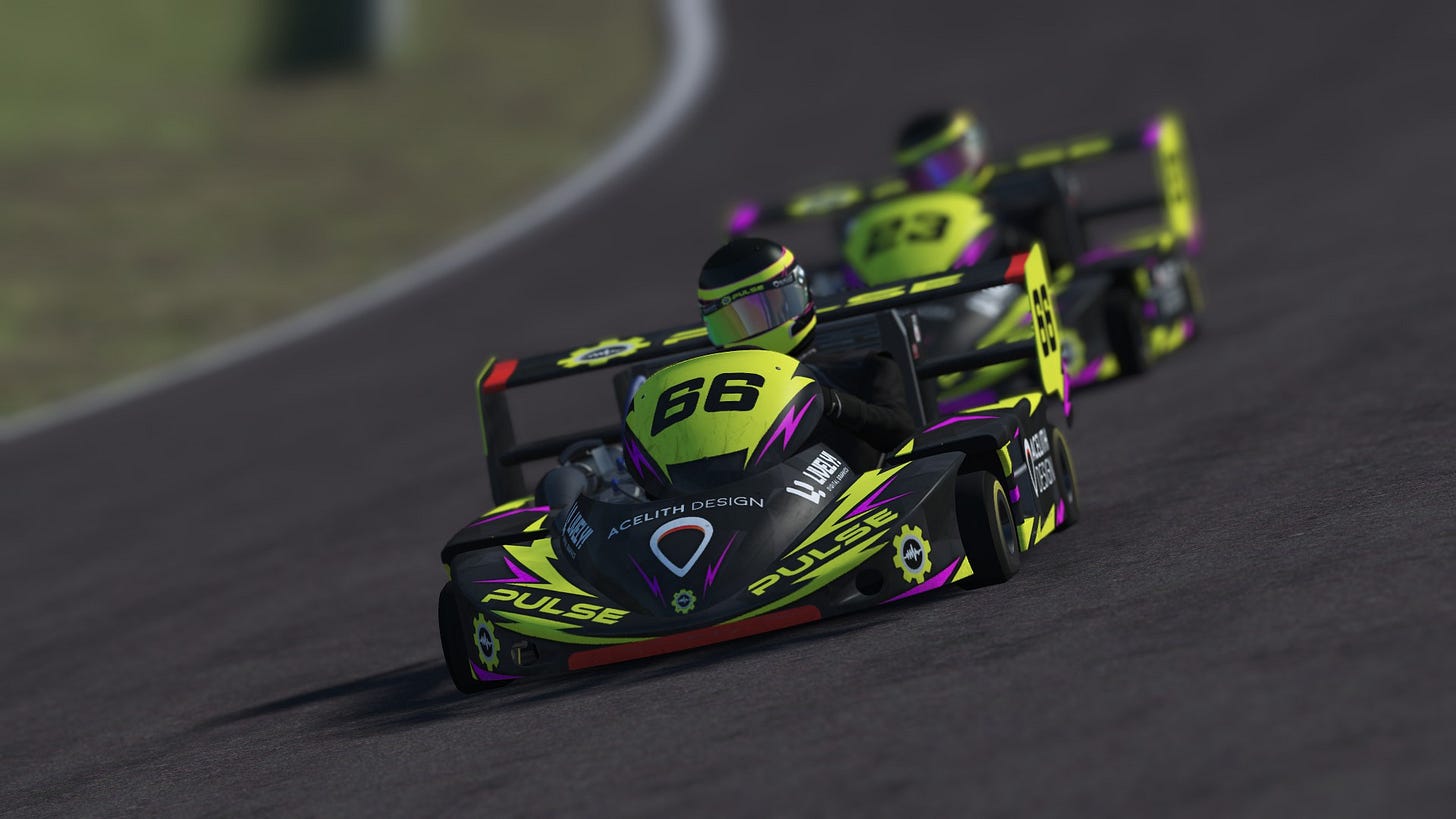Has Sim-Racing Defeated Karting?
It's not hard to guess where all the adults have gone from karting, but we must regroup.
The rational mind might perceive sim racing as a gateway to real-life motorsport, but I posit that we've entered the realm of 'instead of' rather than 'in addition to'.
Back in 2007, I penned an article titled "Is Sim Racing the New Grassroots of Motorsport?" suggesting it could supplant karting as the entry point into racing. While I typically eschew such nomenclature, time has proven this assertion correct. By 'grassroots', I refer to one's first active involvement in racing.
I write this not as someone opposed to sim racing, but as an individual deeply involved in the field since 2006, specifically with 'pro-level' simulations. I've participated in leagues and even clinched a victory or two. While I appreciate the medium, I've experienced burnout in recent years. Organising and competing in the Karting1 Superkart Championship reignited my competitive spirit, bringing with it the constant preoccupation of "what are my competitors doing right now?" It's not anxiety per se, but rather the manifestation of fierce competitiveness that consumes one's thoughts. The accessibility of sim racing acts as an accelerant to this mindset.
Let's examine the numbers. iRacing boasts approximately 100,000 active racers, with some reports suggesting figures as high as 250,000. Given the nature of the subscription model, it's challenging to determine the precise number of active accounts. I'll use the conservative estimate to avoid overstating sim racing's reach, but even this figure warrants analysis.
This is an enormous number, regardless of how you interpret it. We're talking about 100,000 individuals with an ongoing investment in sim racing. While the monthly fee is relatively modest compared to karting, when we factor in the associated costs of a decent PC, wheel, and pedals, we're not dealing with insignificant expenditures.
In contrast, the UK has around 3,000 licensed karters, with significantly fewer seniors due to what I termed "The Adult Karting Exodus." It's challenging to track where these enthusiasts have gone and even more difficult to understand whether potential karters have been diverted elsewhere, but I suspect sim racing is the destination. The comments on my YouTube video on the subject certainly suggest so.
While I often discuss the peculiar alchemical properties of old-school karting that made it more attractive despite possessing qualities associated with motorsport exclusivity (i.e., non-spec classes), it also benefited from being the only viable option. If you wanted to go racing, karting was essentially your sole choice. Fortuitously, karting just happened to be brilliant. The karts were small and light, unlike the behemoths we have today. They were more ‘affordable’ too, even accounting for inflation.
Now, if you're interested in racing, what's your first move? It's evident that most people will engage with sim racing. It's the natural progression of interest. Once upon a time, karting would have been the first choice, but that's no longer the case. While sim racing can be expensive, it frames the spending differently, to the detriment of karting. Approaching karting in a world devoid of alternatives, the costs were what they were – the lowest available for motorsport competition. Now? The framing has shifted dramatically. What was once the most accessible option no longer holds that title. Conversations now centre around sim racing as the 'base'. Cost perception is incredibly important. People spend money based on perceived value, which is contextual and can change subjectively from one moment to the next.
A second-hand kart priced at £750-£1000 represents incredible value. However, to someone completely new to motorsport, they'll compare that to a PC with a wheel and pedal set and think, "Well, I can get that and race whenever I want."
This shift is apparent, but the key point is that sim racing isn't a 'feeder' to karting; it's a fully-fledged alternative. Moreover, sim racing allows drivers to engage with aspirational categories like GT3 racing. Karting, in this context, becomes a niche pursuit primarily for children. That’s certainly a strong perception.
While karting does offer a taste of the 'real thing', the sim-driver market generally leans towards arrive-and-drive options rather than fostering a culture of kart ownership. Consequently, this market of sim racers will likely be served by rental options like Club100 or similar services.
The rise of sim racing represents a paradigm shift in motorsport engagement. It offers unprecedented accessibility and variety, we must consider its long-term implications for motorsports like karting. What we’ve done so far as a sport appears logical and rational at a surface level, but it clearly isn’t working.
I tell anyone interested in karting to just buy a second-hand kart and go. This isn’t aided by karting’s weirdly complex nature. I rarely recommend trying sims, because why encourage someone to race in a competitor to karting? Once they become a simmer, it’s very difficult to then convert them to karting.
Alan Dove




Simracing is where I first started “racing” but I started because I had always wanted to go racing for real and it was the closest I could get. I know other simracers who don’t have much interest in going for real - they end up simracing because they’re gamers who like racing games.
The fact that racing sims are at their heart video games played indoors will attract people who would never participate in organized sport outside.
While other sports games can’t simulate the activity in the way that racing can, sports like soccer are far more accessible to the average person with organized recreational leagues available nearly everywhere on earth. Still, many people choose to play FIFA than to participate in recreational, organized sports as adults!
Of course there are also people who want to go racing, try simracing, and find it’s enough to scratch the itch. Simracing has benefits for these people: unlimited track time, high convenience, low ongoing costs. The fact that the amateur racing world is very opaque to outsiders (someone in a racing family is probably already racing) helps keep them from making the jump.
I do not come from a racing family so had no idea where to start or look. No amateur racing org is waving a flag or trying to find me to bring me into the fold. If I was not obsessive about wanting to go racing for real, I probably would not have figured it out.